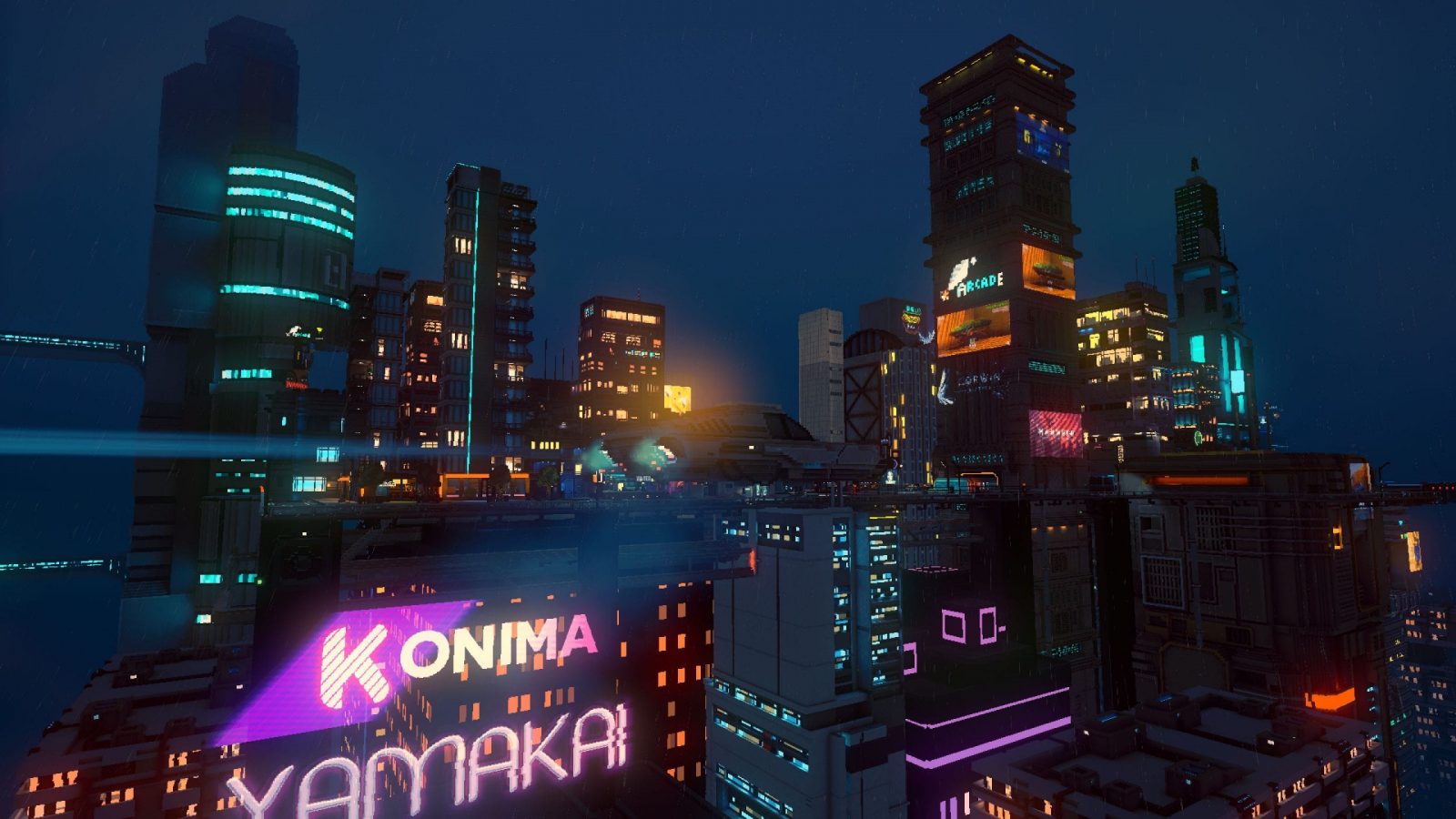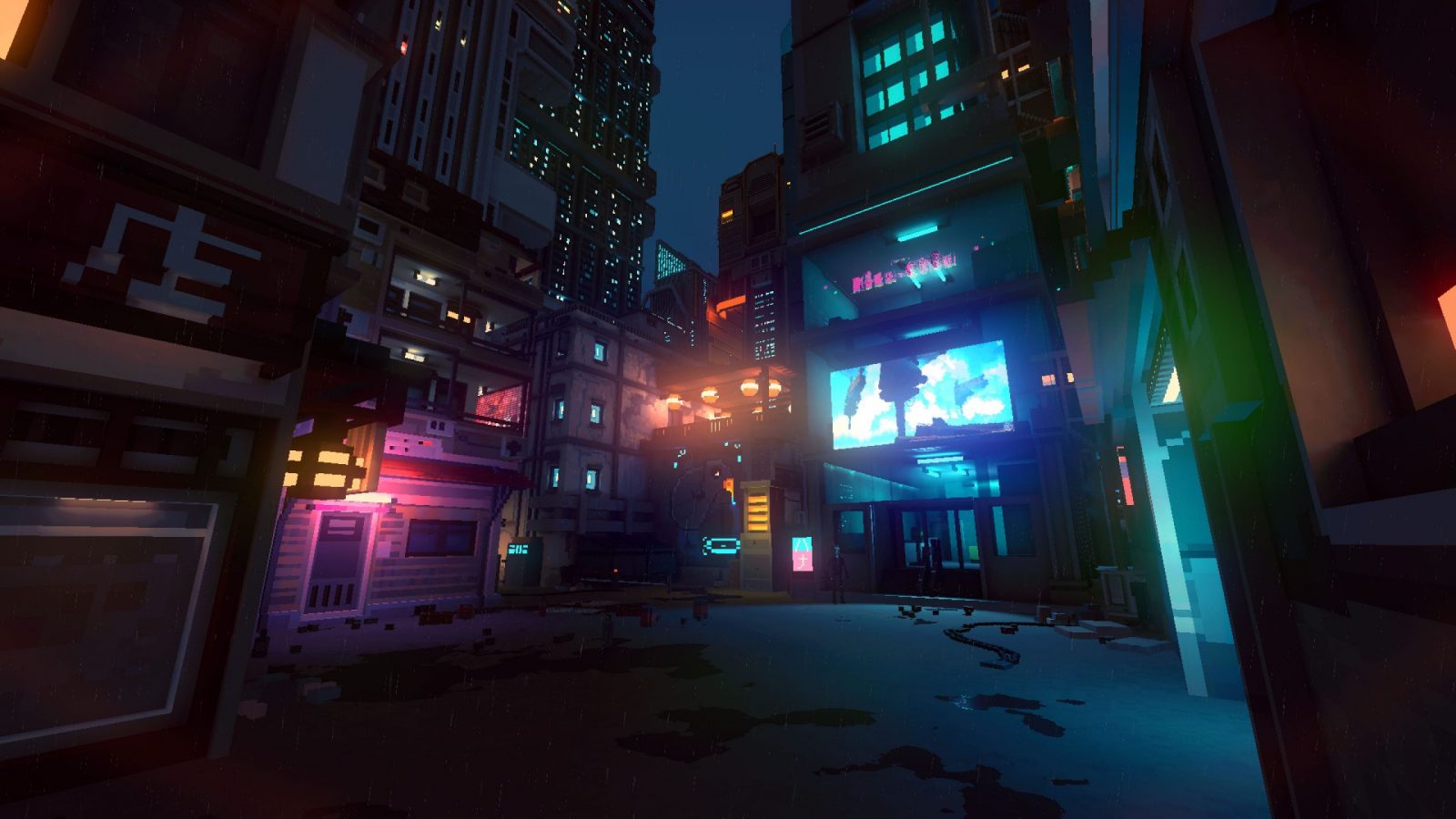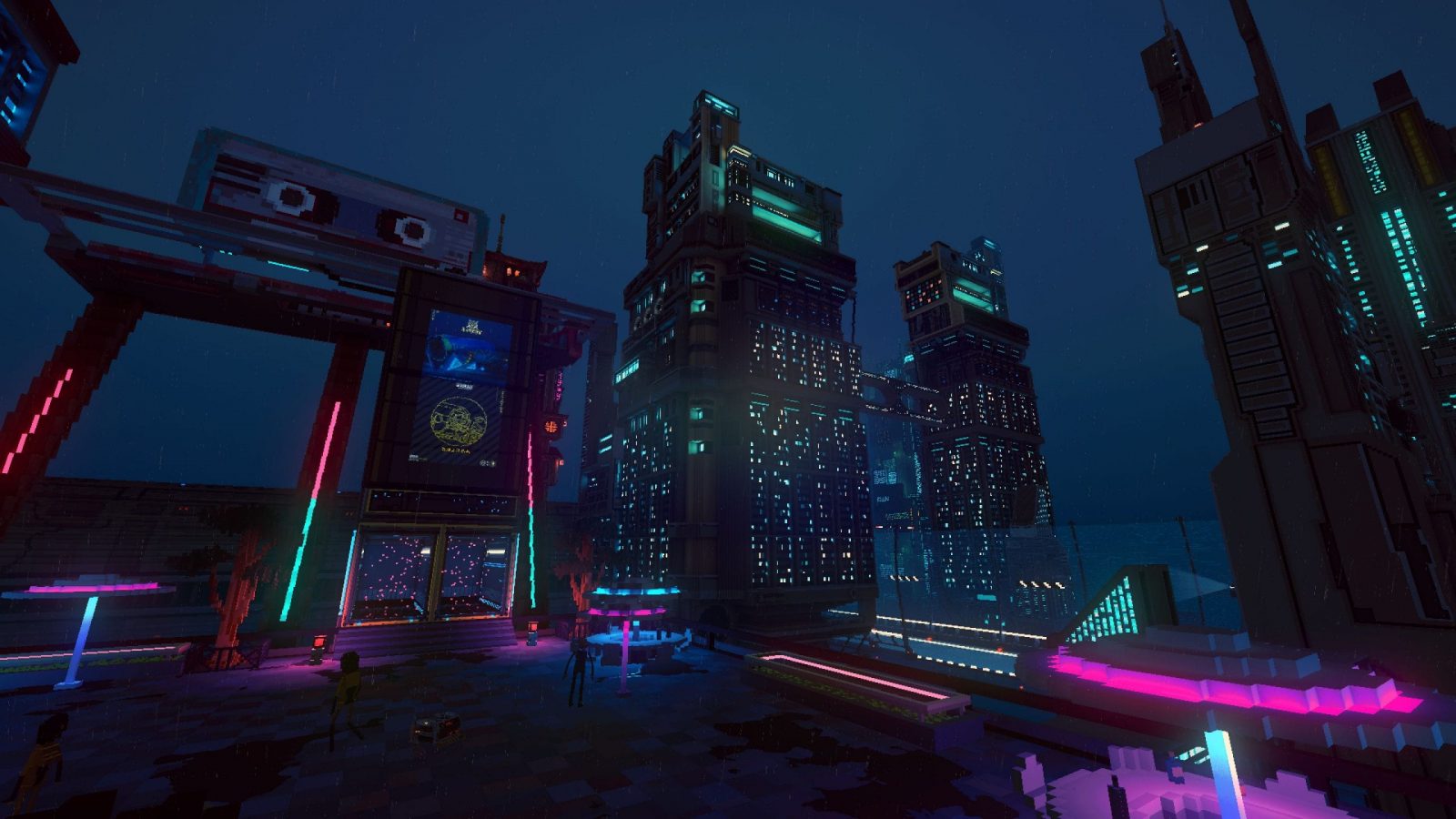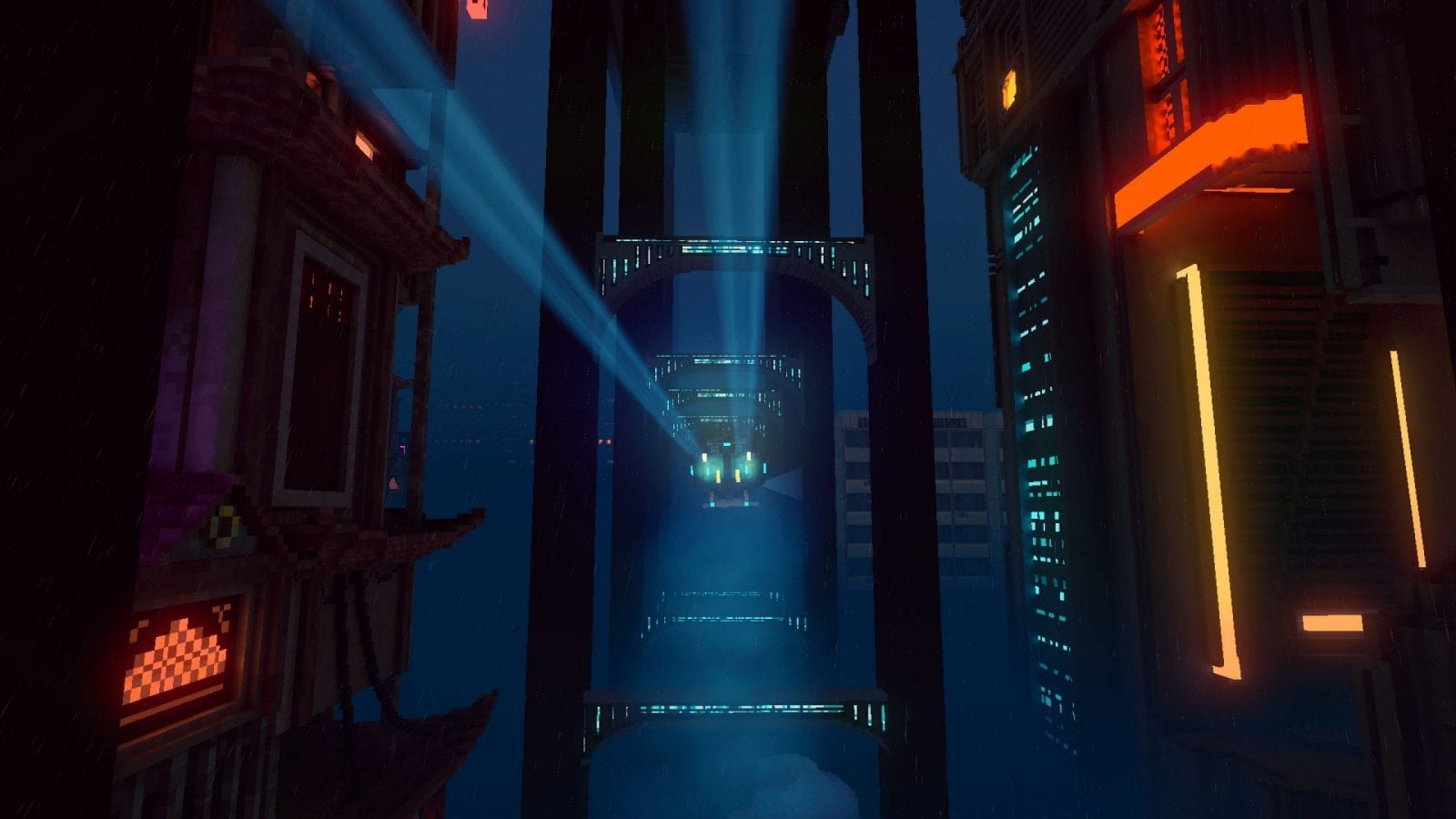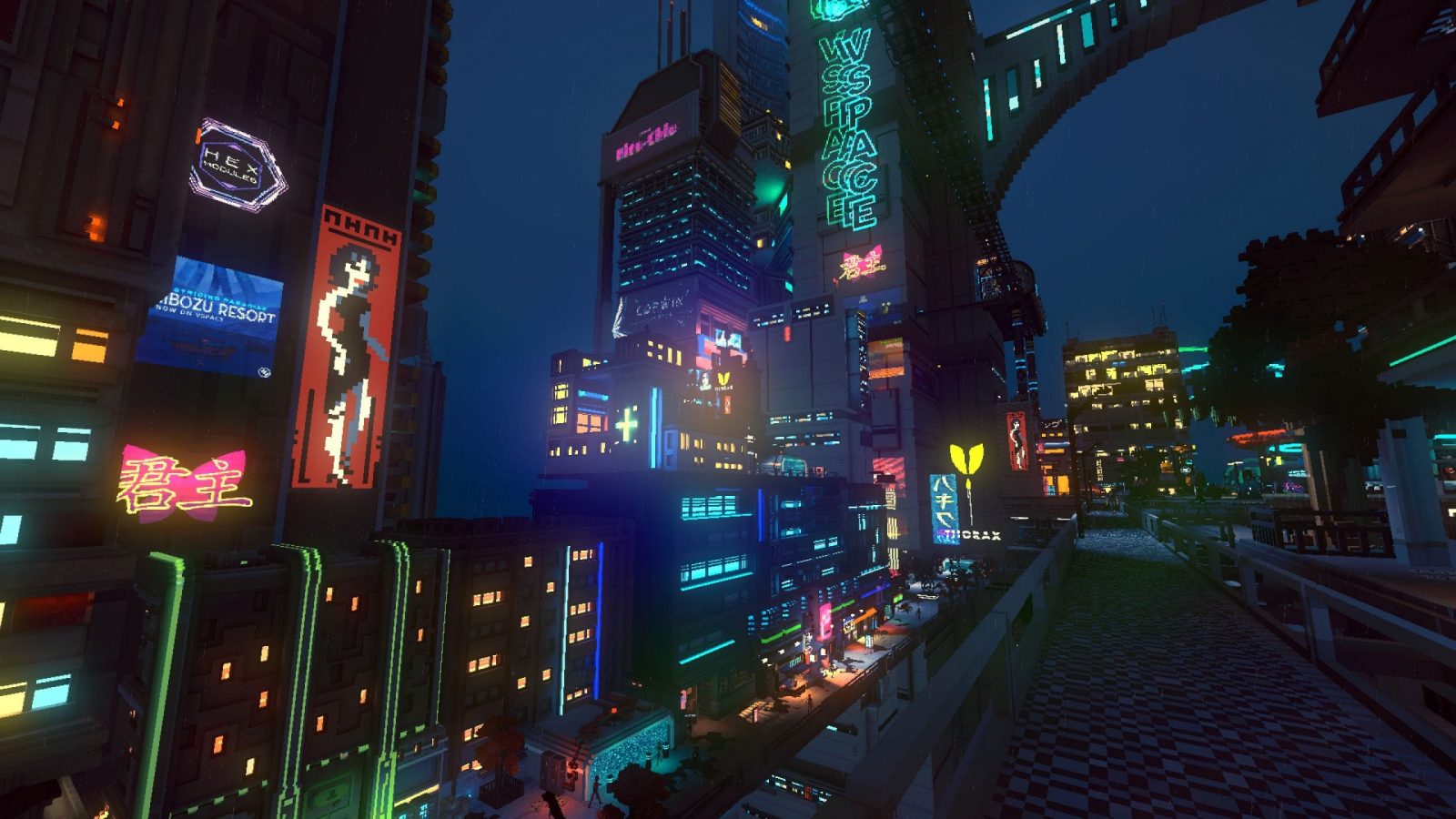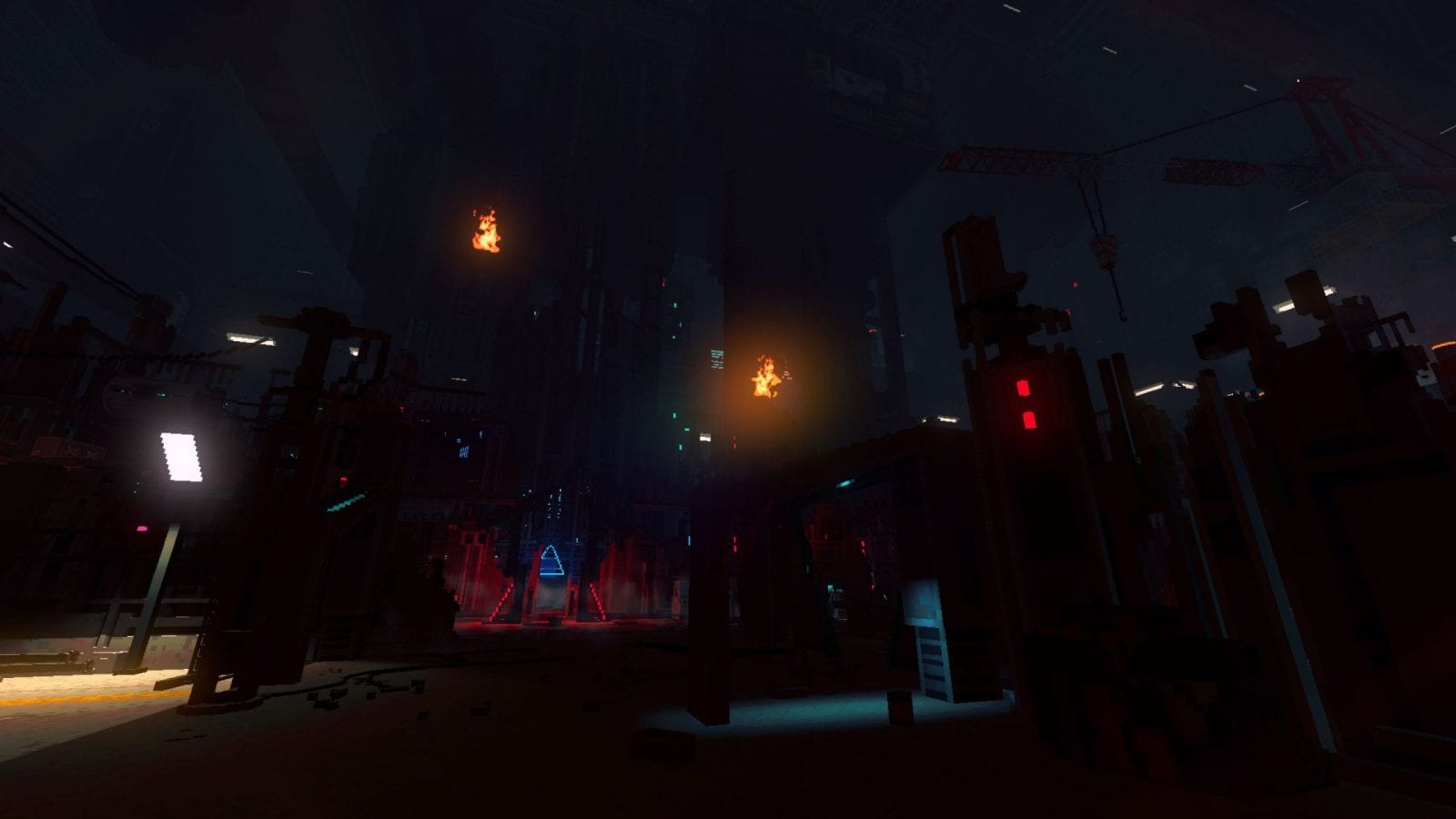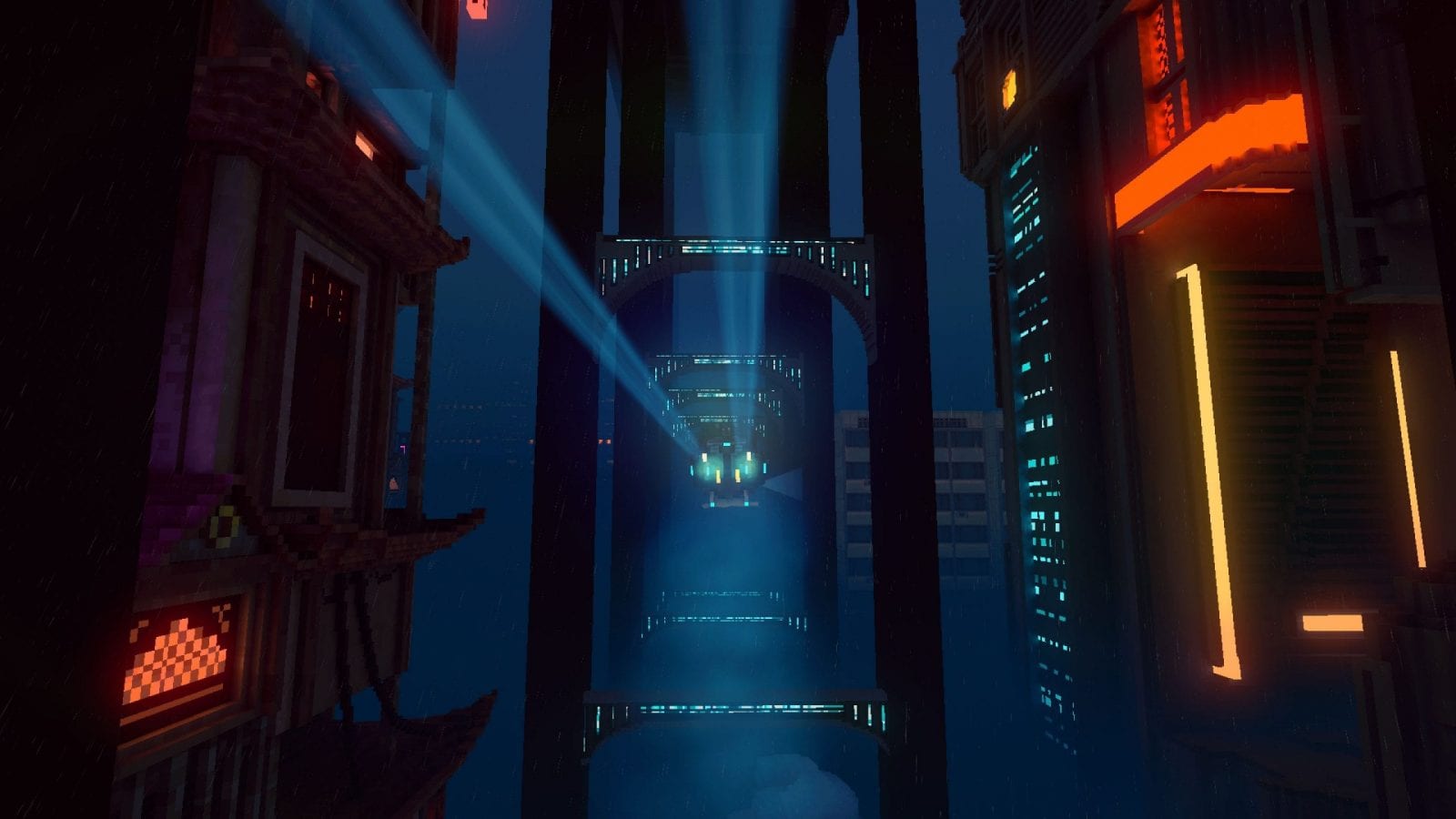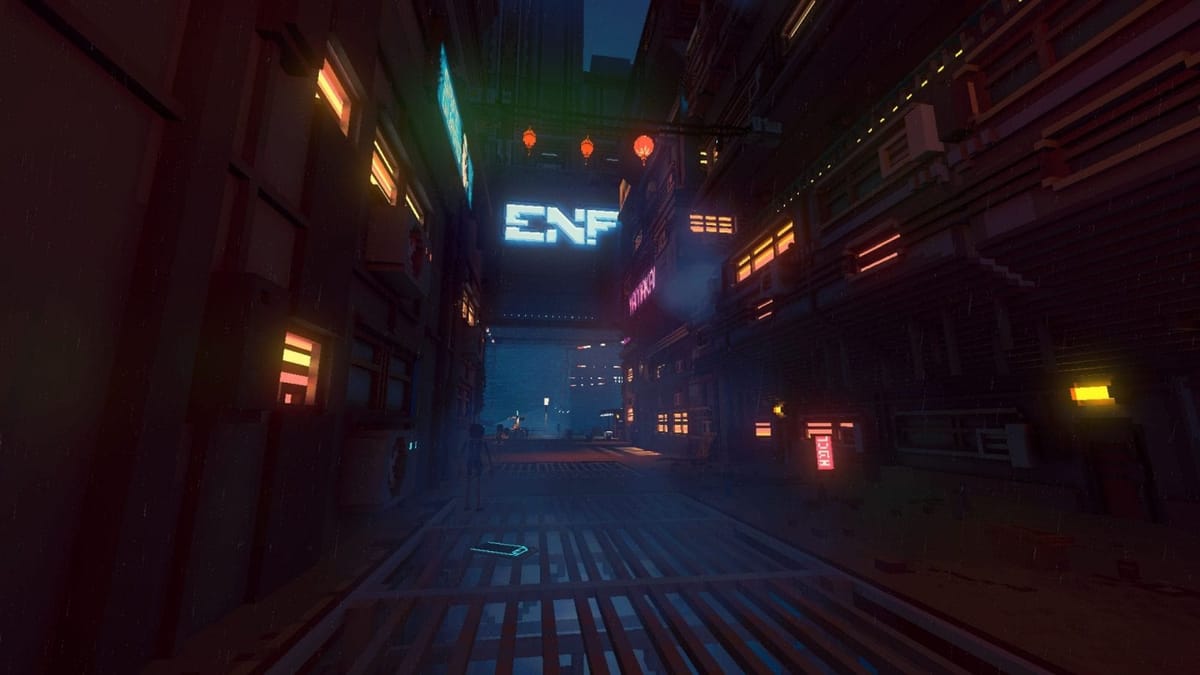
It seems like the cyberpunk genre is the talk of the town recently. There’s such a huge influx of games that it can be hard to find a few that stand out. Maybe it’s due to the impact Cyberpunk 2077 is having on the market, or maybe because it’s such a damn cool genre; whatever it may be, there’s a lot of ‘em. One of these games is Cloudpunk, developed by ION LANDS, which has seen a release on PC, Nintendo Switch, PlayStation 4, and Xbox One. I’ve been tracking this one since it first popped into my social feed, and have been enthralled with it ever since. But, now that I have my hands on it, is it really all that good?
Cloudpunk is a neon-noir story set in the city of Navalis over the course of your first night. You play as Rania who’s working for the shady delivery service, Cloudpunk. Under the instruction of Control, you’re informed Cloudpunk only has two rules: don’t miss a delivery, and don’t ask what’s in the package
NOTE: there will be some spoilers within the rest of the review, so read at your own risk.
It’s a straightforward premise that’s outlined to you right from the first time you take control of your hovercraft, the HOVA. Though, of course, curiosity always gets the better of us, and so our character, Rania, always tends to break the second rule. The first rule, however, is up to you. There are a few times throughout the game where you’ll be instructed to make a time-sensitive delivery, and you have to rely on your skill to do so (and, there’s definitely some skill involved in operating that HOVA, but we’ll get to the mechanics a little later on).
Cloudpunk has an interesting story. You’re the new kid on the block and are taking your first steps into this cyberpunk world. Nivalis is bright and overwhelming, and the characters you meet don’t seem to give a damn about who you are. Everyone is concerned with their own lives, and for good reason; Nivalis seems to be crumbling bit by bit, and only a few people in the city care about getting it back in order. Everyone, in some way, is obsessed with CORA, an AI that has outgrown her britches and has run amok; causing an unprecedented amount of infrastructure issues that have resulted in a huge number of deaths.
Throughout the story, Rania will meet with people and assist them in some way. Usually, the conversations make their way back to CORA. Rania is determined to find answers pertaining to CORA, so much so she’s willing to get involved with the wrong crowd; CorpSec. They’re an oppressive and totalitarian organization running everything behind the scenes, including people’s day to day lives. Rania finds this out the hard way, causing her to lose a friend along the way.
Eventually, Rania has to make a decision that will shape the lives of the people she interacts with, be it helping a pop-star named Dolly who has been replaced by a body double of herself and has no control over her career, or deciding who to save out of a group of people before they all succumb to a nerve agent. Whatever it may be, Rania will face a series of moral dilemmas.
By the end of the game, Rania will have to decide the fate of the city of Nivalis and its residents. She will have to choose between killing the rogue AI CORA and replacing her with her “daughter” — possibly saving everyone in the process —, or sending her “daughter” to an abandoned city — potentially jeopardizing the citizens of Nivalis, but giving them a better chance in the long run.
For the basis of the story, it’s rather interesting. Of course, these cyberpunk elements have been done many times before, but that shouldn’t downplay it one bit. The issue with the story, however, doesn’t come from the story itself, rather through the storytelling. What do I mean by this? Well, for one, the story is told through characters Rania interacts with. Because of this, the game relies heavily on two things; a good script and good voice acting. Unfortunately, it has neither. I’ll touch on the latter later, but for now, the script.
At times, the story can come off rather uninteresting and particularly jarring because the script doesn’t flow very well. Take, for example, the very last interaction Rania has with a new character. At the top of the Spire — the highest point in the game — Rania meets with Jay-K, who, according to CORA, is the direct opposite of Rania. There are a few symbolic elements that prove CORA is right (and of which are interesting in their own right), such as Rania being one of the lowest members of society, while Jay-K is at the highest due to her position as CEO of CorpSec. Not only that, but Rania begins her journey at the lowest parts of Nivalis, while Jay-K sits atop the Spire. Putting symbolism aside for now, the interaction between the two characters is painful. Jay-K begins the interaction by taking the disc containing CORA’s “daughter”, and tells Rania to run along. Rania stands her ground, and within only a couple of lines, Jay-K eases up and tells her to make the decision. There is no real back and forth between the characters, it’s as if Jay-K just gives up. This is meant to be the highlight of the game, where the argument that takes place is meant to shape the entire city of Nivalis and all of its inhabitants, and a character gives off a “nah, I’m done” attitude.
Speaking of decisions, Rania makes numerous choices surrounding various types of moral dilemmas one might experience within their lives. Now, the game is entirely linear, except for when you make these decisions, so Rania will decide for you what quests you do. There was one memorable moment in the game when she talks to an android who is stuck in the middle of nowhere and wants to get back to his “master”. Without any choice for the player, Rania helps the android. At this point, I was on track to complete a main mission in the area, spoke to the android, then was teleported into my HOVA and forced into another mission. And it’s not like I could skip this mission; because the android was a passenger in my car I had to deliver him or else I couldn’t land anywhere in the game. It took about 10 minutes, and one annoying conversation, to reach a decision point; do I take the android back to its master? Or send it to a train station and give it the opportunity to not be indentured to a human?
What did I do? Well, I chose the option that was the closest to complete. At this point, I didn’t care about the end of this android’s story, just that I wanted to get back onto the main story. This brings me to my next point. What is the point of making decisions? Rania clearly makes the important ones, even the ones pertaining to picking up a new quest. The ones the player is left with are the moral dilemmas, but they provide literally zero substance to the rest of the story. Every single result that’s important has been scripted, like a character dying or freeing Rania of her inherited debt. The ones you make provide only two things; a follow up to a character’s story, or some money. The follow up is typically something along the lines of “hey Rania, thanks for your help! I’m ok now. Goodbye”, and doesn’t alter anything else in the story. You might even pick up a new quest from them, but it’ll just end up in you getting even more money from them. My point is, why does the game force the player to make a series of decisions that don’t affect the story in any way?
Let’s delve into Rania; who is she? Well, she’s not from Nivalis, and she’s only in the city to pay off an inherited debt. She’s from the Eastern Peninsula, a place that’s mostly packed with farmers. It’s far, far away from the neon lights of the city, so the first time she enters Nivalis she’s a bit overwhelmed by it. From the get-go, it’s already clear that Rania is not going to be aware of social cues that are common amongst the city-goers, and that plays into the player’s hands since the player is also new to this environment. However, as it turns out, Rania is a bit rough around the edges, and she likes to show it.
And boy, does she show it. Rania may be the most disliked character I’ve ever played. She’s very confusing, and it creates frustrating moments in the dialogue. For example, Rania may severely dislike a character, so much so she makes it abundantly clear that she doesn’t want to have anything to do with them. But, if her AI automata — the AI system that’s part of her car and takes the personality of a dog named Camus — tells her she’s wrong she will immediately 180 and do whatever she can to help that character. If it’s not Rania’s confusing decision-making skills, it’s her attitude. She’s so dislikable that it can be unbearable sometimes. If she has a go at a character, she goes in hard, and you’ll just sit there and think WTF! Why would you even say something like that?.
Rania is also extremely dumb. Let’s refer to CORA. The first interaction Rania has with her is deep in the slums of Nivalis, a place where no one goes in and out of. At this point in the game, Rania is well aware of who CORA is, but she doesn’t have an opinion on whether or not she likes the AI. She’s searching for answers, and that leads her to CORA herself. As she speaks to her for the first time, she doesn’t ask any prying questions and just tries to get herself out of the conversation. When she leaves for her car, she doesn’t put two and two together to realize hey! That’s the AI that everyone is obsessed with, and in fact, she doesn’t even remark on how world-changing this is. I was sitting there like come on, Rania! She’s literally right there! Why don’t you help her!? While Rania decides the next best thing to do is to continue doing her mundane tasks for Cloudpunk.
Rania may be the only character in Cloudpunk that stands out for her bad attitude and confusing decision-making skills, but she’s not the only one to stand out with one other problem; her voice acting. There are only a handful of people, both human and android, that you’ll meet that have amazing voice actors playing them. And look, I’m really not one to bring up bad voice acting because it’s definitely a skill that can be improved. I’ll overlook it in games where one or two characters deliver some cringey lines, but when nearly every character you meet has bad voice acting then I need to mention it. The few that are good are characters like Control, who is an old man that’s just looking out for Rania. He’s lovely, and he feels like the game’s grandpa; always checking to see if you’re ok, amongst other things. But, then you have characters like Rania who might deliver a question as if it’s a statement. At first, I passed it off as being part of the experience. I mean, you’re in a cyberpunk world, and a level of grittiness can play into the atmosphere. But, over time, it becomes clear it’s not a design choice but a poor level of VA-ing.
That being said, it might not always be the VA’s fault; it might be due to the developer’s decision to go with one recorded voice line over another, or they ask the VA to specifically say the line a certain way. This line of thinking is pretty evident throughout the game, as the androids you meet have a specific way of speaking. Some of them are great, like the pop-star Dolly that Rania has a short interaction with, while most other androids speak so… painfully that it quickly takes you out of the immersion. I get it, they’re androids, they’re meant to speak like someone broke their voice box, but after some time you question why one android speaks like someone chopped and changed their lines to make it sound like they have no emotion, while another sounds sincere and genuine when it talks. In all honesty, I spent a good amount of time skipping through the dialogue just so I could avoid having to listen to the characters speak.
Now this game isn’t entirely doom and gloom. Besides an interesting story, the best thing about this game is the environmental design. It’s clear that the developers built the story first, the environments second, and the script third. Nonetheless, the environments are amazing. The game is so goddamn pretty; you could take a picture at any location and it would end up a masterpiece. There’s an environment for everything; the slums, the rich, one that mimics Japanese architecture, even a place for those that abandoned the city. And every single one of these is meticulously designed. I spent a lot of time exploring Nivalis and taking as many screenshots as I could. Although the game has a button to turn off the HUD, it would seriously profit from a photo mode. Hell, while we’re at it, if they somehow utilize RTX in a patch then I’ll immediately reinstall the game and get stuck into screenshotting. I really can’t stress enough how gorgeous this game is.
Now, the last thing I want to touch on is the mechanics. Out of all the sections of this review, this will be brief. Cloudpunk is a walking simulator, plain and simple, and because of that, you get some exceptionally bare-bones mechanics. The only thing the player interacts with is the Holocash machines (basically, an ATM), which requires you to input 5 digits to access a bank account. Otherwise, the player can drive the HOVA, albeit rather uncomfortably. You see, in order to move forward you hold the R2 button, to move around you move the left thumbstick, but if you want to go up and down you need to move the right thumbstick accordingly. If you want to look around, you need to press Square and you’ll unlock the camera. When you’re walking, you can press Square to give you a side-scroller view of the world, hold down on the D-Pad and you’ll get a 3rd person view, and hold up on the D-Pad and you’ll get a first-person view. In short, the only thing you do in this game is deliver packages; that’s literally it.
Cloudpunk starts off as an interesting game that eventually shoots itself in the foot and becomes unbearingly boring. In fact, this game took me 11 hours to complete, but, due to its limited mechanics, it became such a drag to play. I found myself skipping lots of dialogue, and choosing certain decisions because it was the quickest option out of the two. There’s barely anything redeemable about the gameplay other than it’s great if you want something to chill out on. Otherwise, for a game that might have an interesting story and great visuals, but has terrible voice acting and an even worse script, it eventually becomes more of a burden to play than anything else.
Cloudpunk
Below Average
Cloudpunk started off unique and interesting; you’re new to its world and are exploring it alongside the main character, Rania. Eventually, you’ll realize it’s only a cyberpunk delivery simulator with cringey voice acting and an even worse script. By that point, the game loses any redeemable qualities and becomes a burden to play. Just like the main character, and the mechanics, the game has little to no substance to offer.
Pros
- The entire city of Nivalis is beautiful
- Interesting story
- Good to relax with
Cons
- A wallpaper engine interjected with walking mechanics
- The script, voice acting, and story-telling all culminate to make a jarring and confusing experience
- An extremely dislikable main character
- Barely any substance in the gameplay
- Extremely linear

